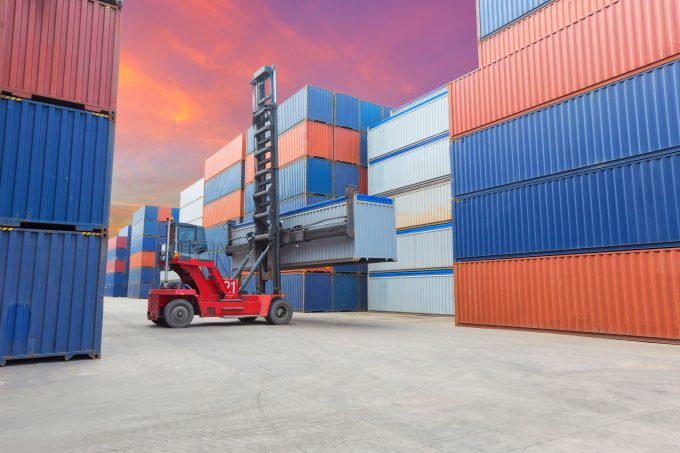Payday in Oz – time for higher transport rates
No profit here, please…
GM: RAISING THE ROOF GGM: IN FULL THROTTLE GZIM: MAERSK BOOST KNIN: READ-ACROSSMAERSK: NOT ENOUGHMAERSK: GUIDANCE UPGRADEZIM: ROLLERCOASTERCAT: HEAVY DUTYMAERSK: CATCHING UP PG: DESTOCKING PATTERNSPG: HEALTH CHECKWTC: THE FALLGXO: DEFENSIVE FWRD: RALLYING ON TAKEOVER TALKODFL: STEADY YIELDVW: NEW MODEL NEEDEDWTC: TAKING PROFIT
GM: RAISING THE ROOF GGM: IN FULL THROTTLE GZIM: MAERSK BOOST KNIN: READ-ACROSSMAERSK: NOT ENOUGHMAERSK: GUIDANCE UPGRADEZIM: ROLLERCOASTERCAT: HEAVY DUTYMAERSK: CATCHING UP PG: DESTOCKING PATTERNSPG: HEALTH CHECKWTC: THE FALLGXO: DEFENSIVE FWRD: RALLYING ON TAKEOVER TALKODFL: STEADY YIELDVW: NEW MODEL NEEDEDWTC: TAKING PROFIT

No party in the sea freight supply chain wants to incur additional charges on a shipment caused by factors “outside of their control”, somebody has to pay: but who should it be?
Online booking platform iContainers has entered the fray in the debate about quay rent and demurrage and detention (D&D) charges levied by container lines to shippers, questioning the justification and saying that carrier “transparency is definitely lacking”.
The US Federal Maritime Commission (FMC) has launched an investigation into port demurrage, detention and free time practices at US ports and has ordered carriers and terminals to provide documentary evidence to explain the workings of their additional charges.
The investigation led by Commissioner Rebecca Dye started at the end of last month and followed a petition filed in January by a coalition of shippers, business associations and trucking organisations demanding that the FMC restrict the ability of ocean carriers to impose what it said were “unreasonable and unfair penalties”.
According to Klaus Lysdal, vice president of sales and operations at iContainers, the investigation is “absolutely necessary” and has come at “the right time”.
Mr Lysdal alleged: “Billing and rate levels [of D&D] skyrocketed as ocean rates took a dive years ago, resulting in plenty of situations where charges and costs are accrued for something the shipper cannot control nor have influence over.”
He continued: “For example, it’s not uncommon to encounter extra charges due to customs exams, which can sometimes take days if not weeks to complete.
“Sometimes, the container is pulled off the terminal to a customs-approved warehouse, which adds into the delay. The exam is completely beyond the client’s control because the container is outside of the port and yet they can get billed demurrage charges,” said Mr Lysdal.
However, a carrier source told The Loadstar today that shipping lines had no influence on the workings of the customs authorities and that an inspection of goods was “entirely the responsibility of the cargo owner or shipper”.
“In most cases we are simply recharging quay rent on behalf of the terminal, who will only accept us as the customer,” said the source. “Shippers should know how much free time that they are entitled to on the quayside and the box D&D charges at the time of the booking,” he argued.
“We simply cannot afford to waive these charges, with rates at such a low level,” he said, but admitted that in the past “commercial decisions had been taken” on charges for some customers.
Notwithstanding the argument over who should be responsible for the charges iContainers said that it hoped that the investigation would “bring about more transparency into the types of charges and the circumstances under which they can be billed”.
It bemoaned: “Some carriers cannot even provide you with the actual amount you will be billed for until they process the invoice. This means that as a shipper, you will be stuck with knowing you have delay fees pending but not know the amount until you get hit with the invoice, which for some carriers can take six months to process.”
The FMC is asking that all stakeholders participate in the investigation and has promised an interim report on its findings and recommendations by no later than 2 September.
Ms Dye said that a final report would be issued to the FMC for consideration, discussion, and vote no later than 2 December.
Comment on this article
Gary Ferrulli
April 23, 2018 at 5:00 pmThere are circumstances beyond someones control but still an accountability. The Customs inspection is a no-brainer, the cargo belongs to the shipper and Customs for whatever reason decides to inspect. It is the shippers accountability.
On other beyond controls – the terminal is jammed and the trucker can’t pick up or deliver, that’s a tougher one. Usually the carrier will mitigate.
On detention, due to weather etc., it’s a question of who’s dime is it on? If the shipper is controlling the move and something happens – it is the shippers accountability. If it is a through intermodal move on the carriers bill of lading, it the carriers accountability. The issues aren’t that complex but the parties make it complex through “commercial decisions”, making exceptions here, but not there.
Inconsistency and not placing the accountability on the party accountable at all times is the issue. Can the FMC fix that? Service contracts were made to take the FMC out of the equation, put it into contract law. Not everything moves under contracts to there is where the problem begins.
Amar Rao
August 01, 2018 at 3:30 amPlease this is very very urgent , All shipping line has given substantial waivers , By not responding or not giving waivers will make things worse for every one , Consignee has no capacity to give this kind of humongous amount of detention charges , If consignee is not able to pay cargo will be abandoned and no Shipping line can clear this cargo.
This is serious issue, Please on urgent basis reply.
Thanks
Container detail is below:
Ref: Container No: OOCU6437513-40, consist 128 unit of old and used
MFD machines of M/s Amar Enterprises,Navi Mumbai.